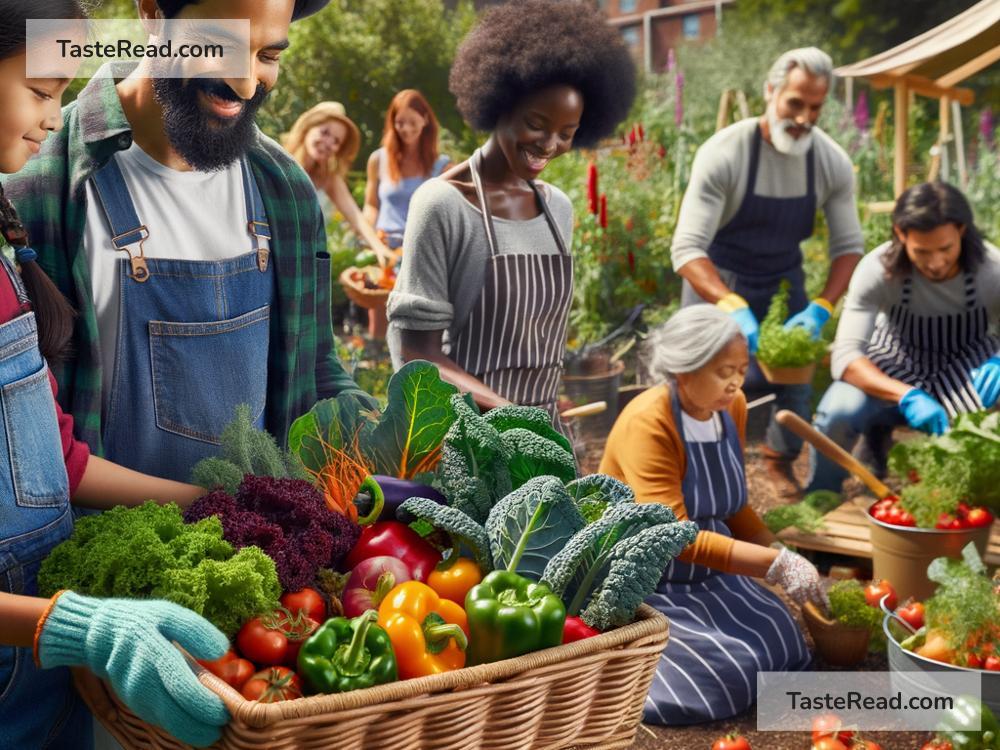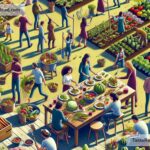The Future of Food and Community-Led Solutions
The way we produce, share, and eat food is changing fast. Climate change, rising populations, and unequal access to resources are challenging our food systems. Many people wonder what the future holds for food and how communities can take action to ensure everyone has enough to eat. Let’s explore the future of food and how community-led solutions can help us create a healthier, fairer, and more sustainable world.
Challenges in Food Systems
Our food systems face major problems. One big challenge is climate change. Extreme weather like droughts, floods, and heat waves can damage crops and make farming more difficult. Many farmers struggle to grow enough food or lose their livelihoods because of these unpredictable conditions.
Another issue is over-reliance on large-scale farming methods. These methods often use harmful chemicals, deplete soil nutrients, and rely on huge amounts of water. While industrial agriculture produces a lot of food, it also harms the environment, leading to deforestation, loss of biodiversity, and pollution.
Food waste is another major concern. Shockingly, nearly one-third of all food produced globally is wasted. This happens at different points — from farms where crops are left to rot, to supermarkets where food is thrown away if it doesn’t look perfect, to households where leftovers end up in trash bins. At the same time, millions of people go hungry every day.
Finally, access to food remains unequal. While some people can afford to buy a wide variety of food, others struggle to access even basic necessities. This inequality is often tied to poverty, lack of infrastructure, and inefficient food distribution systems.
Future Trends in Food
New technologies, innovative practices, and mindful ways of eating may shape the future of food. Here are some trends that could become more common:
-
Plant-Based Foods: With growing concerns about the environmental impacts of meat production, plant-based diets are gaining popularity. Plant-based meat alternatives and protein-rich foods made from legumes, nuts, and algae are becoming more accessible. This shift may help reduce greenhouse gas emissions and animal cruelty.
-
Vertical Farming: Vertical farming uses indoor spaces and advanced technology to grow crops in stacked layers. It saves space, requires less water, and can be done in cities. This method ensures fresh produce is available closer to where people live, cutting down on transportation costs and emissions.
-
Cell-Cultured Meat: Scientists are working on producing meat in labs using animal cells. This technique, called cell-cultured or lab-grown meat, could offer a sustainable way to meet demand for meat without harming animals or the environment.
-
Food Technology Innovations: From AI-powered farming tools to apps that reduce food waste, technology is transforming the way we grow, distribute, and consume food. In the future, farmers may use drones to monitor crops, while consumers could use apps to buy excess food from restaurants or grocery stores at reduced prices.
-
Regenerative Agriculture: Unlike industrial farming, regenerative agriculture focuses on restoring soil health, planting diverse crops, and protecting ecosystems. This method helps fight climate change by capturing carbon in the soil and creating a more sustainable way to farm.
The Power of Community-Led Solutions
Changing food systems isn’t only about governments and big companies making decisions. Communities have a lot of power to create small-scale, local solutions that make a big impact. When people come together, they can create food systems that are more fair, resilient, and sustainable for everyone.
Here are some community-led ideas that are already working in many places:
1. Urban Gardening and Local Farms
In cities around the world, people are turning empty lots, rooftops, and backyards into gardens. Urban gardening allows communities to grow their own food, reducing their reliance on big food companies. Local farms also connect people with fresh, seasonal produce while supporting farmers. Community-supported agriculture (CSA) programs allow individuals to invest in local farms and receive regular boxes of food in return.
2. Zero-Waste Initiatives
Community-led efforts to reduce food waste are gaining momentum. Some groups organize “food rescue” programs, where volunteers collect leftover food from stores and distribute it to those in need. Others host workshops to teach people how to store food properly and cook with leftovers.
3. Food Cooperatives
Food cooperatives are stores owned and run by community members. Unlike regular grocery stores, food co-ops focus on providing affordable, locally sourced, and sustainable products. Members make decisions together, ensuring the co-op reflects the community’s values.
4. Seed Saving and Sharing
Many communities have started saving and sharing seeds to promote biodiversity and help local farmers. By swapping seeds, people preserve traditional crops and make food systems less vulnerable to big companies that control much of the seed market.
5. Educational Events
Education is key to building better food systems. Workshops, community potlucks, and school programs can teach people about healthy eating, sustainable farming, and reducing food waste. When people understand the impact of their choices, they’re more likely to take action.
Moving Forward
The future of food is full of challenges, but it also holds exciting possibilities. By thinking creatively and working together, we can build food systems that take care of both people and the planet. Communities that lead local initiatives show us that change starts small but can grow into something powerful.
Whether it’s planting a garden, joining a food co-op, or simply sharing meals with neighbors, everyone can play a role in shaping the future of food. When we prioritize sustainability, fairness, and health, we create a world where no one goes hungry and food helps bring people together. The future of food isn’t just about what we eat — it’s about how we care for our planet and each other.


